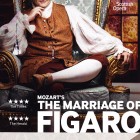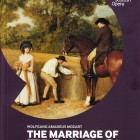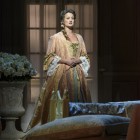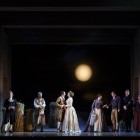Nozze di Figaro 2016Scottish Opera
Read more about the opera Marriage of Figaro
Scottish Opera's 2016/17 mainstage season opens with a revival of Sir Thomas Allen's excellent production of The Marriage of Figaro, first mounted in 2010. The new stagings include Pelléas et Mélisande, which the company has not done in forty years. Duke Bluebeard's Castle appears in tandem with a new piece The 8th Door. A new staging of La bohème is followed by the company's first Philip Glass production, his adaptation of Kafka's The Trial. The medium scale work, touring smaller venues in the autumn, is a new treatment of The Elixir of Love. A new departure is the scheme to present Sunday afternoon concert performances of rare works - by Mascagni (L'amico Fritz), Debussy (L'enfant prodigue), Rossini (La scala di seta) and Puccini (Le villi).
During his singing career Sir Thomas sang Figaro for a short while early on, then settled for the part of the Count, which he sang over many years in most of the world's great houses. Having worked under the guidance of a range of directors, he formed the idea for presenting this wonderful human comedy in a way that revealed every character to be a fully three-dimensional person. All the intricacies of the social structure within this community were beautifully laid before us. With an entirely new cast there were bound to be adjustments worked out in rehearsal. Some of these were subtle and some rather less so. The overture, for instance, contained an interesting new mime sequence with the corn sheaves that would be seen again in the final scene providing a setting for the new bed frame arriving by cart, and Antonio pushing a wheelbarrow with flowers for the Countess's quarters. Even at the third performance, a Sunday afternoon with a hugely enthusiastic and crowded house, there was a feeling that not everything had quite come together, and that the ensemble would continue to develop during the run.
Tobias Ringborg has already shown he is as adept with Mozart as with Verdi. He gave us an unusual soundworld. The orchestra was arranged with the three double basses dead centre, facing the conductor (and us), with cellos next to them and woodwind at the extreme left. This gave a more string-dominant and deeper sound than we have become used to in recent years. The playing was consistently beautiful, and without the sense of rush that we can get. And the vocal lines were not as heavily ornamented as sometimes happens, so when a decoration was provided it clearly served to emphasise the emotion.
Ben McAteer thoroughly deserves to be given an opportunity to try out the title role, and he had no difficulty dominating the stage when required. Anna Devin was an excellent Zerlina a couple of seasons back. and now progressed to Susanna. She did not put a foot wrong, and her 'Deh vieni' was a lovely calm centre to the final act. The Almavivas were promising newcomers. Indeed Eleanor Dennis is a Scot who has been based for several seasons in London gaining experience at the Coliseum, and having already sung the Countess with British Youth Opera and ENO, was now presenting it in excellent Italian. She has a lustrous soprano and makes a tall and elegant figure on stage. The Australian baritone Samuel Dale Johnson, who has been gaining experience in the Jette Parker scheme at Covent Garden, was also at ease with the production, presenting a young Count who seems to mature as the day goes on.
Backing up these young artists, you could hardly have a greater combination of experience than Donald Maxwell and Marie McLaughlin. The latter has probably appeared in more performances of this wonderful work, whether as Susanna or, more recently, as Marcellina, than even Sir Thomas has. As usual, she was deprived of her last act aria - though she gave us a bar of the tune as she left the stage at the end of her scene - a clever touch. Donald Maxwell's celebrity turn as the gardener was a masterclass for any young baritones watching who might be cast in this role. They inevitably struggle with the depiction of age as well as intoxication. Maxwell seemed entirely natural in his second act capers - though it is tempting to suggest that he may have gone a wee bit over the top - a young singer in that part would never dare be such a ruthless scenestealer. Even in this company Graeme Broadbent easily held his own as Bartolo.
The young Polish mezzo Hanna Hipp was one of the most naturally-acted Cherubinos, and sang beautifully. Paul Curievici was also excellent, and made a virtue of the contrast between his two roles - doubled, as they were in the very first staging when the Irish tenor Michael Kelly combined the parts. He did not overdo Curzio's stammer - a tradition in the part that goes right back to Kelly himself.
In all, this was a thoroughly enjoyable revival, even if the original 2010 version had the edge in some characterisation, and was the lighting quite the same? Certainly we didn't get any fireworks at the end this time round.
Two additional performances have been scheduled for early January at the Empire Theatre, Liverpool. Scottish Opera used to visit the city regularly in the seventies, but not for many years. There are a few cast changes.
Performance Cast
- Figaro the Count's valet
- Susanna the Countess's maid
- Bartolo a doctor, the Countess's former guardian
- Marcellina Bartolo's housekeeper
- Cherubino the Count's page
- Count Almaviva a Spanish grandee
- Don Basilio a priest and music master
- Countess Almaviva
- Antonio a gardener, Susanna's uncle
- Don Curzio a lawyer
- Barbarina daugher of Antonio
- First Peasant Girl
- Second Peasant Girl
Production Cast
- Conductor
-
Tobias Ringborg (Exc Oct 27; Nov 1, 3, 9, 17)
Timothy Burke (Oct 27; Nov 1, 3, 9, 17)
- Director
- Designer - Sets
- Designer - Costumes
- Lighting
-
Robert B Dickson (Revival)
- Choreography
-
Steinvor Palsson (Revival)
- Orchestra
- Sponsor
Performance DatesNozze di Figaro 2016
Theatre Royal, Glasgow | Glasgow
12 Oct, 19.15 14 Oct, 19.15 16 Oct, 16.00 18 Oct, 19.15 20 Oct, 19.15 22 Oct, 19.15
His Majesty's Theatre, Aberdeen | Aberdeen
27 Oct, 19.15 29 Oct, 19.15
Eden Court Theatre | Inverness
1 Nov, 19.15 3 Nov, 19.15 5 Nov, 19.15
Festival Theatre, Edinburgh | Edinburgh
9 Nov, 19.15 11 Nov, 19.15 13 Nov, 16.00 17 Nov, 19.15 19 Nov, 19.15






